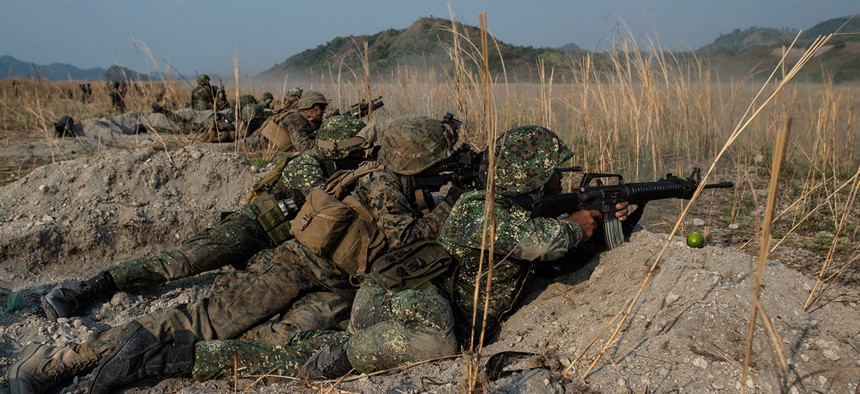
U.S. and Philippine Marines fire their rifles “shoulder-to-shoulder” during Balikatan 16, at Crow Valley, Philippines in April. Lance Cpl. Jessica N. Etheridge/Marines
U.S. Troops Are Still in the Philippines, Despite Duterte’s Insults and Threats
PACOM commander Adm. Harry Harris will head to the islands ‘optimistic’ but expecting a ‘refocusing’ of joint exercises.
The U.S. continues to use five military bases in the Philippines despite anti-American statements by Manila’s president in recent months, the head of the U.S. Pacific Command said Tuesday.
President Rodrigo Duterte has expressed general disdain for Americans — calling them “discourteous” and insulting their president — and has explicitly called for the removal of U.S. troops from his country and a “separation” between the allies.
But other than a one-month delay to an annual meeting to plan joint exercises, Duterte’s remarks have yet to lead to any change in the military-to-military relationship, PACOM commander Adm. Harry Harris said.
“We haven’t been asked to remove U.S. forces from the Philippines, including any special operating forces operating in Mindanao,” Harris said at a Defense One event in Washington, D.C. “We haven’t been asked to not put our P-3s and P-8s at Clark [Air Base], to not run surveillance there.”
When pressed, Harris acknowledged that some of Duterte’s remarks have been “concerning,” but said he had “no reason to believe” the Philippines would stop allowing the U.S. to use the five bases there.
It’s in keeping with a line the rest of the administration has toed since the bombastic Duterte was inaugurated this summer. In September, the U.S.’s top diplomat for the region emphasized the distinction between what he called “colorful” public statements and actual policy changes.
“The president of the Philippines has not, as far as I know, taken action to stop or cancel exercises, to request the removal of any U.S. military assets or personnel,” Daniel Russel, the assistant secretary of state for East Asian and Pacific Affairs, told reporters at the time. “There’s a difference between talking about these things and actually stopping. I’m not saying that won’t happen, that it couldn’t happen, merely that there’s a distinction to be made.”
Harris will visit the Philippines on Tuesday for that delayed exercise-planning meeting, which will convene representatives from PACOM, the State Department, and the Defense Secretary’s office; and their Filipino counterparts.
“I would expect maybe a refocusing...of some of the big exercises in 2017, but that’s the purpose” of the meeting, Harris said. “Unfortunately, I don’t know the full scope of any of that until I get to the Philippines and talk to Gen. [Ricardo] Visaya, [chief of staff of the armed forces]. But I’m optimistic.”
Another issue requiring coordination between the U.S. and its regional allies is the expectation that a portion of the “couple thousand” citizens who left to join the Islamic State will return home “radicalized and weaponized” as ISIS loses territory, Harris said. He’s already told Special Operations Command Pacific to work on the issue, and Duterte has acknowledged the threat—though the U.S. may disagree with him about how to address it.
Little wonder, then, that Harris wrapped the event to head to a meeting at the State Department.







